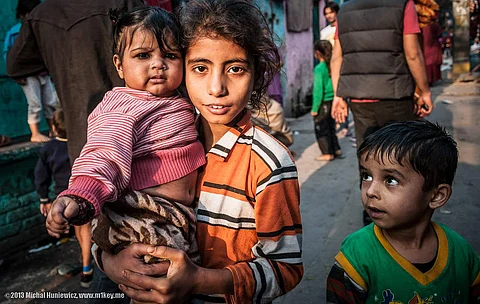

The Centre on Wednesday told the Supreme Court that it is not practical to prescribe specific teacher-pupil ratio of special educators for children with special needs in general schools given the uncertainty about the number of such students there.
The government told a bench headed by Justice A M Khanwilkar that the policy is to try and train as many general teachers so that they are able to cater to the children with special needs and this is being done on an active scale.
Additional Solicitor General (ASG) Madhavi Divan, appearing for the Ministry of Education, said there are general schools and special schools which cater to specific need of children with the special needs.
In a general school, we feel that it is not possible and not practical to prescribe specific ratio given the range of disability, given the uncertainty of how many children in that class there may be. So therefore, the policy is - try and train as many teachers who are general teachers to be able to cater to those children with disability. That is being done on an active scale, the ASG told the bench, also comprising justices Dinesh Maheshwari and C T Ravikumar.
Divan said secondly, the policy is also to try and ensure that there are special educators and that is left to the state government and they can prescribe how many they want, if they want specifically.
The bench, which was hearing a plea pertaining to appointment of duly qualified special teachers to impart quality training and education to children with disability, reserved its order in the matter.
Divan told the bench that nearly 4,000 government post has now been identified for persons with special needs and therefore, now they are going to occupy public posts on a much larger scale than before, Does the Central government has the relevant empirical data regarding area-wise, how many are specially-abled children who are required to attend schools, the bench asked.
Divan, while arguing that they don't have area-wise details but have a broad figure, said she will get better instructions on this issue.
The bench observed that in a given area, there may be more children with special needs for whom the authorities need to provide infrastructure and schools and for that, there is a need to evolve a flexible policy.
Suppose, in a given school, there are 10 students, you can have a ratio of at least one teacher for addressing the issues of specially-abled. If in a given school, there are 100, then the same ratio will be 10 teachers for 100 students. That has to be evolved by you, the bench said.
Divan said the Ministry of Education feel it want to leave that call to be taken by the state governments depending on their regional requirements.
The bench also heard submissions advanced by other lawyers, including advocate Shoeb Alam who was appearing for the petitioners.
He argued that requirement to fix pupil-teacher ratio is a statutory duty of the Central government under the provision of the RTE Act read with relevant rules.
He said the Central government has no authority to delegate the power to fix the ratio to the states.
The Centre had earlier told the apex court that there is a dedicated component for education of children with special needs as part of the Samagra Shiksha' scheme and support is provided to address their requirements in general schools.
In an additional affidavit filed in the court, the Centre government had said that several provisions for children with special needs have been included under the Samagra Shiksha' scheme and the support has been enhanced from Rs 3,000 per child per annum to Rs 3,500.
It had said as per the data available with unified district information system for education, there are 22.5 lakh children with special needs in the country.
In terms of teachers, as per data available, 4.33 lakh general teachers have been trained to teach children with special needs in addition to teaching general children. There are also 28,535 special teachers for children with special needs, the affidavit had said.
The affidavit was filed in the court which is hearing a matter raising the issue about obligation of schools, including of the concerned state government to ensure appointment of duly qualified special teachers to impart quality training to children with disability in the ratio enunciated in central enactments as also the schemes propounded by the Central government from time to time and their service conditions.
It had said the Samagra Shiksha' scheme is in consonance with the Right of Children to Free and Compulsory Education Act, 2009.
